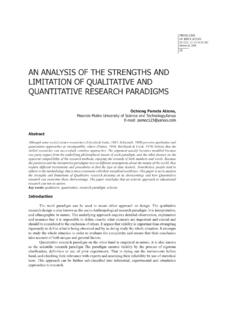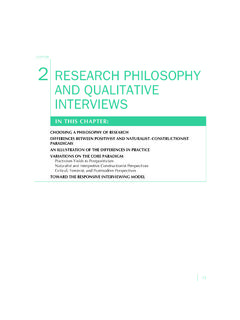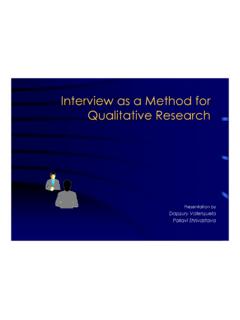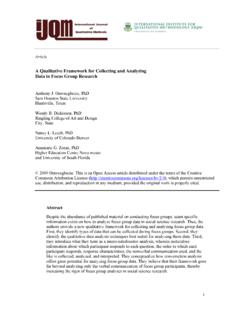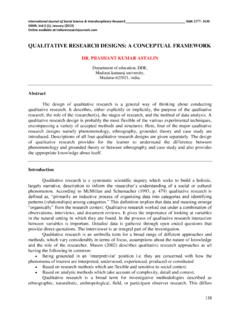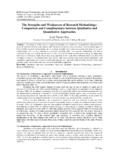Transcription of AN ANALYSIS OF THE STRENGTHS AND LIMITATION OF …
1 13problemsof educationin the 21st centuryVolume 13, 2009AN ANALYSIS OF THE STRENGTHS AND LIMITATION OF qualitative AND QUANTITATIVE RESEARCH PARADIGMS Ochieng Pamela Atieno, Masinde Muliro University of Science and Technology,Kenya E-mail: some social science researchers (Lincoln & Guba, 1985; Schwandt, 1989) perceive qualitative and quantitative approaches as incompatible, others (Patton, 1990; Reichardt & Cook, 1979) believe that the skilled researcher can successfully combine approaches.
2 The argument usually becomes muddled because one party argues from the underlying philosophical nature of each paradigm, and the other focuses on the apparent compatibility of the research methods, enjoying the rewards of both numbers and words. Because the positivist and the interpretive paradigms rest on different assumptions about the nature of the world, they require different instruments and procedures to find the type of data Nonetheless, people tend to adhere to the methodology that is most consonant with their socialized worldview.
3 This paper is set to analyze the STRENGTHS and limitations of qualitative research focusing on its shortcomings and how Quantitative research can overcome these shortcomings. The paper concludes that an eclectic approach to educational research can not an option. Key words: qualitative , quantitative, research paradigm, word paradigm can be used to mean either approach or design. the qualitative research design is also known as the socio-anthropological research paradigm .it is interpretative, and ethnographic in nature.
4 The underlying approach requires detailed observation, explanation and assumes that it is impossible to define exactly what elements are important and crucial and should be considered to the exclusion of others. it argues that validity is important than attempting rigorously to define what is being observed and by so doing study the whole situation. It attempts to study the whole situation in order to evaluate the complexity and ensure that their conclusion take account of both unique and general research paradigm on the other hand is empirical in nature; it is also known as the scientific research paradigm The paradigm ensures validity by the process of rigorous clarification, definition or use of pilot experiments.
5 That is trying out the instruments before hand, and checking their relevance with experts and assessing their reliability by use of statistical tests. This approach can be further sub-classified into inferential, experimental and simulation approaches to educationin the 21st centuryVolume 13, 200914 The Assumptions of qualitative Designs 1. qualitative researchers are concerned primarily with process, rather than outcomes or products. 2. qualitative researchers are interested in meaning how people make sense of their lives, experiences, and their structures of the world.
6 3. the qualitative researcher is the primary instrument for data collection and ANALYSIS . data are mediated through this human instrument, rather than through inventories, questionnaires, or machines. 4. qualitative research involves fieldwork. the researcher physically goes to the people , setting, site, or institution to observe or record behavior in its natural setting. 5. qualitative research is descriptive in that the researcher is interested in process, meaning, and understanding gained through words or pictures. 6. the process of qualitative research is inductive in that the researcher builds abstractions, concepts, hypotheses, and theories from details.
7 Human behavior is significantly influenced by the setting in which it occurs; thus one must study that behavior in situations. the physical setting , schedules, space, pay, and reward and the internalized notions of norms, traditions, roles, and values are crucial contextual variables. research must be conducted in the setting where all the contextual variables are operating. past researchers have not been able to derive meaning from experimental research. the research techniques themselves, in experimental research, [can] affect the findings.
8 The lab, the questionnaire, and so on, [can] become artifacts. subjects [can become] either suspicious or wary, or they [can become] aware of what the researchers want and try to please them. additionally, subjects sometimes do not know their feelings, interactions, and behaviors, so they cannot articulate them to respond to a questionnaire. one cannot understand human behavior without understanding the framework within which subjects interpret their thoughts, feelings, and actions. researchers need to understand the framework.
9 In fact, the objective scientist, by coding and standardizing, may destroy valuable data while imposing the researcher s world on the subjects. field study research can explore the processes and meanings of events. The genealogy of the Quantitative and qualitative research Paradigmsthere are some fundamental differences between qualitative and quantitative research paradigms which lie primarily at the level of assumptions about research (epistemological and ontological assumptions) rather than at the level of the general, a lot of quantitative research tends to be confirmatory and deductive.
10 But there are many quantitative researches that can be classified as exploratory as well. And while much qualitative research does tend to be exploratory, it can also be used to confirm very specific deductive hypotheses. the problem is that some scholars don t acknowledge the richness of both traditions. they don t recognize that both qualitative and quantitative research can be used to address almost any kind of research , if the difference between qualitative and quantitative is not along the exploratory-confirmatory or inductive-deductive dimensions, then where is it?

